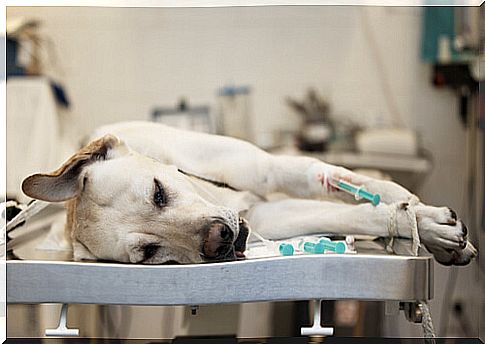Blood Donor Dogs

As with humans, animals also need blood transfusions because of accidents, surgery or illness. And, as with humans, it is sometimes very difficult to get donors.
For this reason, in several countries there are already blood banks, both public and private, for dogs and other animals, and also many veterinary clinics encourage owners so that their animals can make donations.
Such is the importance of this gesture, that if your dog can contribute to saving the lives of his fellows, do not hesitate to turn him into a regular donor.
What are the requirements for dogs to be blood donors?

In order for your dog to be a donor, he must meet the following requirements:
- Weigh more than 20 pounds;
- Be between 1 and 8 years old;
- Have a good general state of health and normal blood clotting;
- Do not suffer from blood-borne diseases (filariasis, borreliosis, babesiosis, leishmaniasis, brucellosis and erlichiosis);
- Have all the vaccines up to date;
- Have been dewormed.
The procedure is similar to humans. 450 ml of blood is taken from the dog. The process takes between 20 and 40 minutes and can be performed every three months.
The animal is placed on a table, usually lying on its side. Then, a small area of your neck is scraped and then the needle is inserted to draw blood.
While some dogs may feel a little dizzy after donation, most don’t have any unusual reactions and generally recover much faster than humans.
It is important to know that a single donation can save two lives, as blood is separated into two basic components: red blood cells and plasma.
Keep in mind that, after all, blood transfusion can only be done when the dogs, donor and recipient, share the same blood group, or when the groups are compatible.
Dogs have 8 different blood groups, called erythrocyte antigens (DEA, for their abbreviations in English), numbered from 1 to 8 and that can be classified in positive and negative. DEA 1 is “universal”, meaning it is compatible with all groups.
Some dog breeds – such as the Greyhound – have the universal blood type. For this reason, veterinarians consider them the perfect donors.
The Labradors are also ideal donors, thanks to his personality and quiet temperament, so they allow the blood extraction is done without stress and without them having to be sedated.
The Akita Inu , on the other hand, are generally not good donors due to the high concentration of intra-erythrocyte potassium in the blood of these animals.
Benefits for dogs that donate blood

While the donation of blood in animals is, as in the case of humans, an altruistic and supportive gesture to encourage this behavior, in some countries, some benefits have been granted to dogs that donate their blood. Among them, the following stand out:
- Free consultations;
- Complete blood count;
- Application of annual vaccines;
- Priority in case they need a transfusion;
- A can of food as a reward.
Know that donating blood does not cause any harm to the animal. It does not hurt and does not transmit infections or illnesses. And rest assured, as soon as the blood is drawn, your dog’s body starts producing more blood to replace it.
Anyway, if you have any questions, you can always ask the vet. But if your dog meets the necessary requirements to be a donor, don’t give up on this possibility.
Blood needs are sudden and unexpected, so blood banks must always have blood bags available in urgent cases.
That is why it is so important to have a sufficient supply of blood products, be able to act in emergencies and perform transfusions safely, quickly and effectively, providing each patient with the most appropriate treatment for their pathology.
In addition, since canine blood has a shelf life of between approximately 30 and 35 days, supplies must be replenished constantly. And while many animals that reside in kennels are used as permanent donors, it is important that everyone is aware of the need for their dogs to become regular donors as well.
Thus, both he and you will be contributing to saving lives and this is, without a doubt, the best reward for you and your pet.









